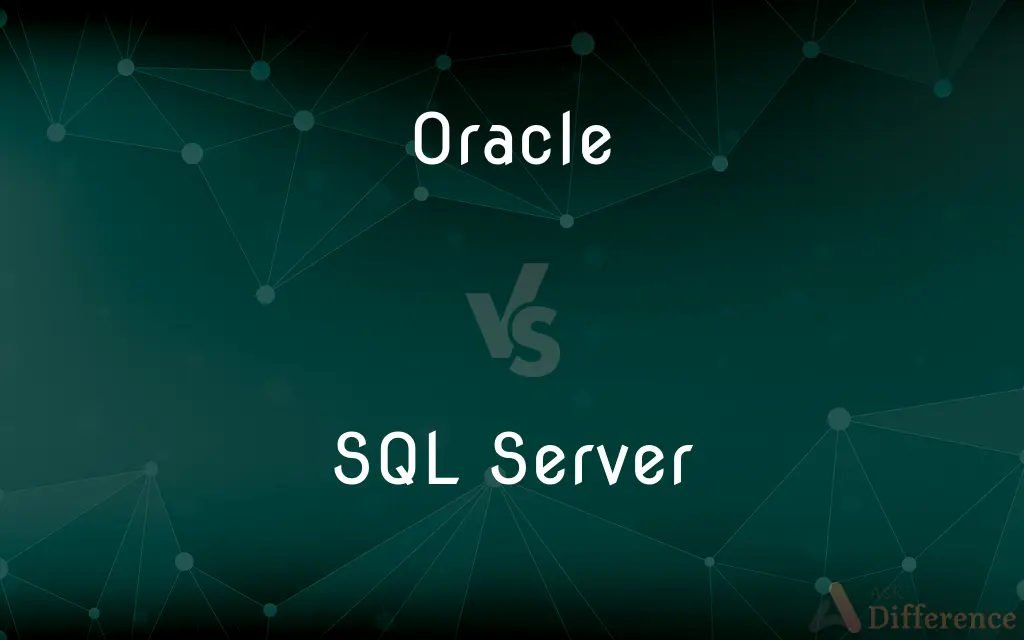Oracle vs. SQL Server — What's the Difference?
By Tayyaba Rehman — Published on January 12, 2024
Oracle and SQL Server are both relational database management systems; Oracle is multi-platform, while SQL Server is primarily Windows-based.

Difference Between Oracle and SQL Server
Table of Contents
ADVERTISEMENT
Key Differences
Oracle Database, developed by Oracle Corporation, is a multi-model database management system known for its robust feature set, scalability, and reliability. It supports a wide range of operating systems including Linux, Windows, and UNIX. SQL Server, developed by Microsoft, is also a relational database management system, but it is primarily designed to run on Windows platforms. SQL Server is known for its ease of use, integration with other Microsoft products, and strong business intelligence capabilities.
In terms of performance, Oracle databases are often preferred for large-scale, high-volume applications and complex transactions. They offer advanced features like Real Application Clusters (RAC) for high availability. SQL Server, while also capable of handling large-scale operations, is widely recognized for its user-friendly interface and easier management, especially for users already familiar with the Windows ecosystem.
Oracle supports a wider range of programming languages and development frameworks, making it a versatile choice for diverse application environments. SQL Server, while also supporting various languages, is particularly optimized for seamless integration with other Microsoft products like .NET and Visual Studio, which can be a significant advantage for developers in the Microsoft environment.
In terms of licensing and cost, Oracle is often perceived as more expensive, particularly for larger organizations and more complex implementations. SQL Server offers a range of editions, including the free Express edition, which can be more cost-effective for small to medium-sized businesses or less complex database needs.
While both Oracle and SQL Server offer robust security features, Oracle is often highlighted for its advanced security options, which are crucial for industries like finance and healthcare. SQL Server also provides comprehensive security features, but Oracle's offerings are particularly strong in scenarios requiring very high security levels.
ADVERTISEMENT
Comparison Chart
Operating System Support
Multi-platform (Windows, Linux, UNIX)
Primarily Windows-based
Performance & Scalability
Preferred for large-scale, high-volume applications
Well-suited for a range of application sizes
Development Flexibility
Supports a wide range of languages and frameworks
Optimized for integration with Microsoft products
Licensing and Cost
Generally higher cost, more complex licensing
More cost-effective options, including a free edition
Security Features
Advanced security options for high-level needs
Comprehensive security, integrated with Windows
Typical Use Cases
Large enterprises, complex transactions
Small to medium businesses, Windows-centric environments
User Interface
More complex, steeper learning curve
User-friendly, especially for Windows users
Integration with Other Technologies
Broad integration capabilities
Seamless integration with Microsoft technologies
High Availability and Disaster Recovery
Advanced features like Real Application Clusters (RAC)
Strong capabilities, with emphasis on simplicity
Community and Support
Extensive global community and support
Strong support within Microsoft ecosystem
Compare with Definitions
Oracle
Oracle is a multi-model database management system.
Our company uses Oracle for its enterprise-wide data management needs.
SQL Server
SQL Server provides robust business intelligence capabilities.
Our business analysts utilize SQL Server for advanced data analytics.
Oracle
Oracle offers advanced security features for sensitive data.
Our financial data is securely stored using Oracle's advanced security options.
SQL Server
SQL Server is known for its user-friendly interface.
Our team appreciates SQL Server's intuitive interface for managing our database.
Oracle
Oracle is known for handling large-scale and complex databases.
Oracle efficiently manages our large databases with millions of transactions daily.
SQL Server
SQL Server is optimized for Microsoft technology integration.
We use SQL Server with our .NET applications for efficient development.
Oracle
Oracle supports various operating systems including Linux and UNIX.
We deployed Oracle on our UNIX servers for its robust performance.
SQL Server
SQL Server offers a range of editions, including a free version.
For our small project, we chose the SQL Server Express edition.
Oracle
Oracle is widely used in large enterprises and industries with high-volume data.
The healthcare industry often relies on Oracle for managing patient records.
SQL Server
SQL Server is a relational database management system primarily for Windows.
We implemented SQL Server in our Windows environment for its seamless integration.
Common Curiosities
What is SQL Server primarily used for?
SQL Server is used for database management, especially in environments integrated with Microsoft products.
Is SQL Server compatible with Linux?
Recent versions of SQL Server are compatible with Linux.
Which is more expensive, Oracle or SQL Server?
Generally, Oracle is considered more expensive, especially for large-scale deployments.
What makes Oracle suitable for large enterprises?
Its scalability, robustness, and advanced features make Oracle suitable for large enterprises.
What are the main differences in licensing between Oracle and SQL Server?
Oracle's licensing is generally more complex and can be more expensive, while SQL Server offers more straightforward and cost-effective options.
Can Oracle run on Windows?
Yes, Oracle can run on Windows, as well as on Linux and UNIX systems.
Can I integrate SQL Server with .NET applications?
Yes, SQL Server integrates seamlessly with .NET and other Microsoft technologies.
Which database is better for a small business, Oracle or SQL Server?
For small businesses, especially those using Windows, SQL Server might be more cost-effective and user-friendly.
Are Oracle databases hard to learn?
Oracle databases can have a steeper learning curve, especially for those not familiar with database systems.
What is Oracle used for?
Oracle is used for managing large-scale, complex databases in various industries.
Does Oracle offer a free version?
Oracle offers a free Express edition, but it's more limited compared to SQL Server's free edition.
Is Oracle better than SQL Server in terms of performance?
Oracle is often preferred for very high-volume and complex transaction environments, but SQL Server also offers strong performance.
Which database system should I choose for a Windows-based environment?
In a Windows-based environment, SQL Server is often the preferred choice due to its integration and ease of use within the Microsoft ecosystem.
Can SQL Server handle large-scale databases?
Yes, SQL Server can manage large-scale databases, though Oracle is often chosen for extremely large or complex databases.
Does SQL Server offer strong security features?
Yes, SQL Server offers comprehensive security features, particularly integrated with the Windows environment.
Share Your Discovery

Previous Comparison
First Language vs. Second Language
Next Comparison
System Call vs. System ProgramAuthor Spotlight
Written by
Tayyaba RehmanTayyaba Rehman is a distinguished writer, currently serving as a primary contributor to askdifference.com. As a researcher in semantics and etymology, Tayyaba's passion for the complexity of languages and their distinctions has found a perfect home on the platform. Tayyaba delves into the intricacies of language, distinguishing between commonly confused words and phrases, thereby providing clarity for readers worldwide.
















































